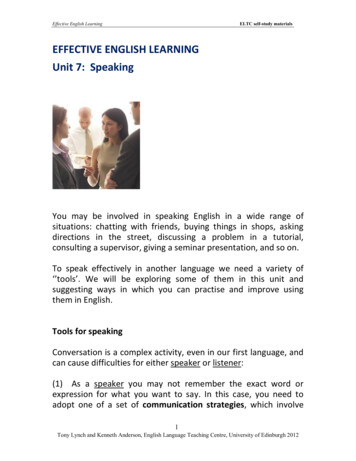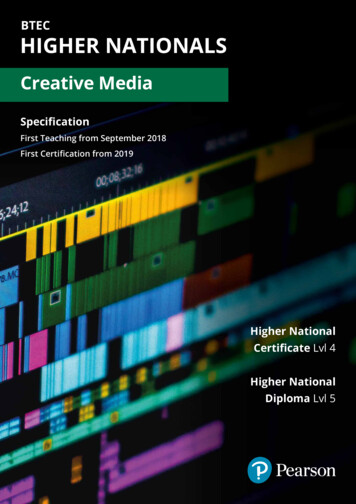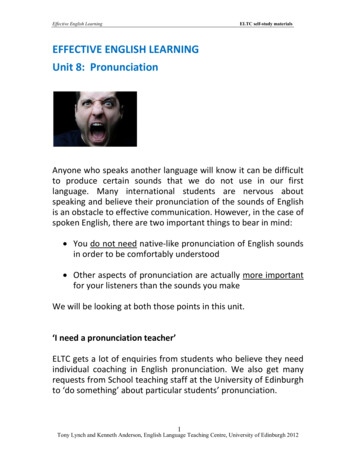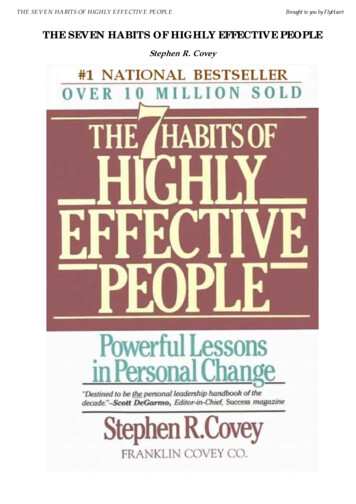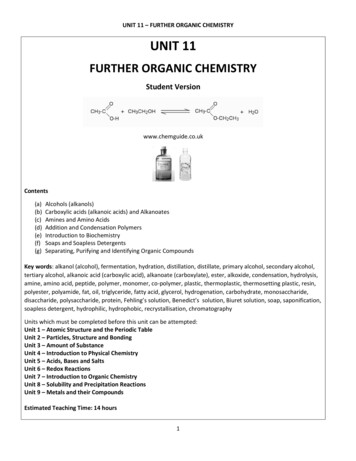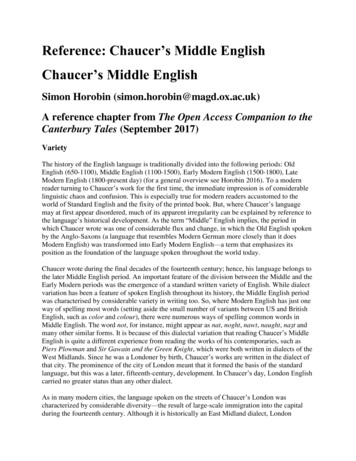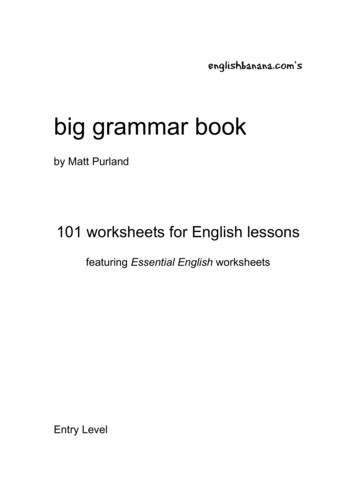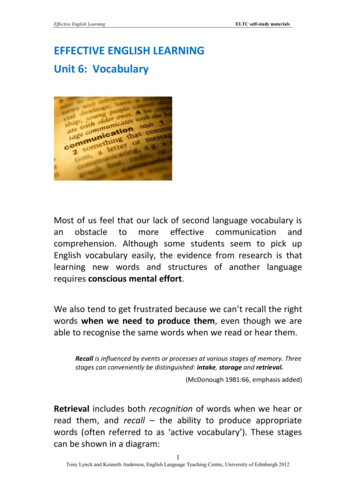
Transcription
Effective English LearningELTC self-study materialsEFFECTIVE ENGLISH LEARNINGUnit 6: VocabularyMost of us feel that our lack of second language vocabulary isan obstacle to more effective communication andcomprehension. Although some students seem to pick upEnglish vocabulary easily, the evidence from research is thatlearning new words and structures of another languagerequires conscious mental effort.We also tend to get frustrated because we can’t recall the rightwords when we need to produce them, even though we areable to recognise the same words when we read or hear them.Recall is influenced by events or processes at various stages of memory. Threestages can conveniently be distinguished: intake, storage and retrieval.(McDonough 1981:66, emphasis added)Retrieval includes both recognition of words when we hear orread them, and recall – the ability to produce appropriatewords (often referred to as ‘active vocabulary’). These stagescan be shown in a diagram:1Tony Lynch and Kenneth Anderson, English Language Teaching Centre, University of Edinburgh 2012
Effective English LearningELTC self-study materialsIn this unit we will be looking at some practical ways in whichwhat you do can do actively at the intake (learning) stage willlead to more effective storage in long-term memory, and sofacilitate recall.Organising the inputIt is well known in psychology that if the material to bememorized is organized in some fashion, people can usethis organization to their benefit. This happens becauseorganized material is easier to store in and retrieve fromlong-term memory.(Thompson, 1987: 46)So our next Language Learning Principle is:Principle 8: OrganiseTask 6.1Do you organise English vocabulary in any way when you learn it? If so, how?(This is an open question, so see whether you can discuss it with someoneelse, face to face or on-line).2Tony Lynch and Kenneth Anderson, English Language Teaching Centre, University of Edinburgh 2012
Effective English LearningELTC self-study materialsIt is reasonable to suppose that the way we approach learningnew words will affect the way they are stored in our memory.Psychologists have found that we don’t store the vocabulary ofour first language as a list of separate items like a dictionary.Instead, we store them in a complex network of associations.So when you set out to extend your English vocabulary, try tolearn words, not individually, but as parts of a framework, ornetwork, of interrelated meanings.The specific benefits of creating a network are: Words are not perceived as separate items, but asmembers of larger semantic [meaning] networks. It activates our store of existing vocabulary, thusencouraging recall. Association aids retention. We develop a knowledge of the semantic relationshipsbetween words and the networks to which these wordsbelong. That allows us to make predictions as we read orlisten, which is an important skill. A knowledge of the relatedness of words in a language isnecessary for fluency in speaking and writing.(Machalias, 1991: 20)The next three tasks explore practical ways of organising yourvocabulary learning to consolidate meaning links.One relatively simple way of learning vocabulary in fields ofmeaning is to collect words together under a general heading.3Tony Lynch and Kenneth Anderson, English Language Teaching Centre, University of Edinburgh 2012
Effective English LearningELTC self-study materialsTask 6.2: ListingIn the space below, write down as many words as you can think of under theheading STUDY (some examples are given):STUDYlecturesexamsresearchlibraryreadLists like that are not organised internally. Looking for acreative ways of organising words helps make our learningmore focused, more interesting, and therefore probably moreeffective.Task 6.3: ClassifyingOn a sheet of paper, group the words you listed in Task 6.2 into categories,according to the criteria you think are appropriate.4Tony Lynch and Kenneth Anderson, English Language Teaching Centre, University of Edinburgh 2012
Effective English LearningELTC self-study materialsThe simple example below shows how word-fields can beorganised to show networks of meanings. This is similar to a‘mind-map’ or ‘spidergram’.Task 6.4: Building a networkExtend the Research diagram by adding as many words as you can, inappropriate places.5Tony Lynch and Kenneth Anderson, English Language Teaching Centre, University of Edinburgh 2012
Effective English LearningELTC self-study materialsSynonymsEnglish words with similar meanings (synonyms, or nearsynonyms) can be confusing, so an important aspect of learningwords in sets or fields is learning the differences betweenthem.Task 6.5: Comparing elements of meaningCan you complete the following grid? Put ticks in the appropriate boxes (theones for pour have been put in already).accidentallyPourliquidsolidparticles (e.g.salt, sand) dispersed insmall quantitiesSpillScatterSprinkleTo check your solution against the Feedback, click hereTask 6.5 illustrates the substitution relationship betweenwords. The four words are all from the same word-class – verbs– and a choice has to be made between them.6Tony Lynch and Kenneth Anderson, English Language Teaching Centre, University of Edinburgh 2012
Effective English LearningELTC self-study materialsWords that go together: CollocationA second important type of relationship between words iscollocation – the tendency for certain items to occur togetherin sentences.Learning words contextualized in typical phrases or sentencescan help you use them appropriately. Noticing the typicalpatterns in which words are used is an important skill.Task 6.6How many words or phrases can you suggest to fill the blanks in thefollowing?1.In a recent , Brown (1994) provided evidence that .2.The results that the risks of chronic heart diseaseare significantly increased by smoking.3.These findings our hypothesis.To check the Feedback, click hereLater in this unit we will be looking in more detail at how to findout about the regular collocations of English words.Many sets, or families, of words are systematically related inboth meaning and form, for stanalyticallyunanalysedanalyticalanalyser7Tony Lynch and Kenneth Anderson, English Language Teaching Centre, University of Edinburgh 2012
Effective English LearningELTC self-study materialsSuch sets of words are related by derivation (origin). Formal,academic writing use many words like these, which are built upfrom ‘component parts’ – prefixes, stems, suffixes, etc. –carrying different elements of meaning and grammaticalinformation.So it is very useful to know the most usual types of meaningwhich the most common prefixes, stems and suffixes represent.Task 6.7List as many words as possible derived from the To check your solution, click hereNotice that the tasks you have just done may not have involvedusing any new vocabulary, but reviewing your vocabularyknowledge in a particular field.When you are learning new vocabulary, combining that with areview of what you know will help you form appropriatemeaning associations.8Tony Lynch and Kenneth Anderson, English Language Teaching Centre, University of Edinburgh 2012
Effective English LearningELTC self-study materialsTask 6.8The words shown below are significantly more frequent in academic writingthan in general English. (They come from the Academic Word List, which welook at under ‘Resources’).1.Study them and select any you don’t know, or whose meaning / use youare unsure about.2.Check their meanings in a dictionary. We recommend the CambridgeOnline Dictionary: /3.To help you learn them, try to find links between them and the wordsyou know, using the techniques illustrated in Tasks ncestraightforwardundergowhereby9Tony Lynch and Kenneth Anderson, English Language Teaching Centre, University of Edinburgh 2012
Effective English LearningELTC self-study materialsBoth meaning and sound associations are important inretrieval: meaning links appear to facilitate recall, when weneed to produce appropriate words, while recognition relies onsound.One clear conclusion from research is that language learnersshould pay special attention to the stress pattern whenlearning new English words (Channell 1988).Task 6.91.For all the words in the Task 6.8 list with two or more syllables, underline thesyllable that has the main stress. For example,integrity(If you are not sure, check in the dictionary)3.Then write the words in groups with the same stress pattern.Check your answers herePrinciple 9: Use mnemonicsAnother approach to helping recall of vocabulary, which manylearners have found useful, is the use of memorising tricks ortechniques called mnemonics:"Mnemonic" means "aiding memory" . and since so much of languagelearning depends on being able to memorize and retrieve all kinds oflanguage routines, it is somewhat surprising that foreign language learners tend to know little about them.(Thompson, 1987: 43)The value of mnemonics has been recognised since ancienttimes. Three mnemonic techniques which have been found tobe effective are: paired associates; sound and meaning links;and spatial grouping.10Tony Lynch and Kenneth Anderson, English Language Teaching Centre, University of Edinburgh 2012
Effective English LearningELTC self-study materialsMnemonic technique 1: Paired associatesIn this technique you think of a word in your own languagewhich has some similarity in both form and meaning to the‘target’ word in English. The similarity need not be very strong.The first language word acts as a kind of link between theEnglish word and its translation. These link words have beencalled security words (Curran, cited in McDonough 1981: 67).For example, an English-speaking learner of Russian mightnotice that the Russian word for eye,glazreminds them of the English word glass. This could beassociated with the target word through a security word suchas glasses (which you wear over your eyes), or perhaps glasseye (a false eye) or eyeglass (a sight aid with a single lens).An Italian student at Edinburgh told us he had used a similartechnique to learn the English phrasal verbput up withwhich has a similar meaning to the more formal word tolerate.The sound of put up with reminded him of the Italian verbsputare, which means ‘spit’. He associated the action of spittingwith angrily rejecting something you cannot put up with.Task 6.10Can you see any risks or disadvantages in using mnemonic methods whichmake connections between your first and second languages?To see our answer, click here11Tony Lynch and Kenneth Anderson, English Language Teaching Centre, University of Edinburgh 2012
Effective English LearningELTC self-study materialsMnemonic technique 2:Sound and meaning links in the second languageCohen and Aphek (1980) found that the most efficienttechnique for their students was to look out for possible soundand meaning connections between words in the secondlanguage.For example, the same Italian learner who described learningput up with also learned the phrase prick up one's ears byassociating it with pick up, which has similarities in form andmeaning.Mnemonic technique 3: Spatial groupingThompson (1987: 45) reports research which suggests that“rearranging words on a page to form patterns, such as atriangle, appears to improve recall”. A pattern seems to workbetter than a simple column, and several columns are betterthan one.Task 6.11Have you ever used one of these three techniques, or some other trick, tohelp you remember words?Task 6.12Select a new word or word that you want to learn (for example, from the listin Task 6.8). Choose a suitable mnemonic technique, and see if it works foryou.12Tony Lynch and Kenneth Anderson, English Language Teaching Centre, University of Edinburgh 2012
Effective English LearningELTC self-study materialsPractice and revisionResearch confirms the important of actively using and revisingnew vocabulary. Studies of vocabulary learning strategiesconclude that good vocabulary learners find opportunities to try out new words in real-life communication – this islikely to be more effective than ‘safer’ contexts such as in class or privatestudy ask questions to check what they know about words test themselves revise regularly – ‘little and often’ is better than occasional, large-scalerevision(based on findings reported in Nunan, 1991; McCarthy, 1990; Thompson 1987)These points underline our twelfth Language Learning Principle(explored further in the Speaking unit)Make the most of your opportunitiesWhat vocabulary do I need to know?Every day during your programme of study you will be reading(and perhaps hearing) dozens of English words and phrasesthat are new to you, or whose precise meaning in an unfamiliarcontext is not clear.It is impossible – and unnecessary – to learn all the new wordsyou meet. So you need some way of selecting appropriatevocabulary for learning to make the intake manageable.13Tony Lynch and Kenneth Anderson, English Language Teaching Centre, University of Edinburgh 2012
Effective English LearningELTC self-study materialsTask 6.13How can you decide which words you need to learn?‘Core’ vocabularyFor successful everyday communication in English you need aminimum ‘core’ vocabulary of around 2000 words. Some EFLdictionaries such as the Longman Dictionary of ContemporaryEnglish and the Macmillan English Dictionary (see the sectionon Dictionaries, below) contain a basic list of definingvocabulary like this, often in the back of the book. Theexplanations of words in the dictionary are written using only,or mainly, this basic vocabulary.Task 6.14Check to see if the English dictionary you use contains such a list of ‘core’ or‘defining’ vocabulary. If it does, read through the list. You should find thatyou know (at least one meaning of) all, or almost all the words listed.Make a note of any that you didn’t know, and try to learn them, using any ofthe techniques from this unit.Academic Word List (AWL)A useful guide to the words you are likely to need for academicstudy is the Academic Word List. This is the outcome ofresearch by Dr Averil Coxhead (Coxhead, 2000). You can readmore about her work l-coxheadFrom her research, Coxhead identified 570 word families whichare frequent in academic writing, but much less common ingeneral English use.14Tony Lynch and Kenneth Anderson, English Language Teaching Centre, University of Edinburgh 2012
Effective English LearningELTC self-study materialsThe AWL does not include very specialised or technical wordsrelated only to specific subjects – it identifies words that are infrequent use across a wide range of academic disciplines.The list represents each word family by a headword; forexample, the headword assess represents its ‘family’ of derivedwords: assess, assessment, assessor. So the list of 570headwords gives you access to a much larger list of academicwords.The word families are grouped into 10 sublists, according totheir frequency: Sublist 1 contains the most frequent words inthe AWL, and so on. The words you worked with in Task 6.8came from Sublist 10, the least frequent.Information about the AWL, the list and sublists themselves,and advice on how to learn them is available on-line cwordlist/Some other excellent Web resources offer ways of using theAWL to build up your academic ghamhttp://www.nottingham.ac.uk/ alzsh3/acvocab/University)Exercises for the Academic Word List (Gerry Luton, University of /AWL/index.htmOn the Academic Vocabulary site you will find the AWLHighlighter, which highlights in bold the AWL words in any textyou paste in. You can also use the AWL Gapmaker to testyourself on AWL words in a text.15Tony Lynch and Kenneth Anderson, English Language Teaching Centre, University of Edinburgh 2012
Effective English LearningELTC self-study materialsAnother useful tool using the AWL is the English Vocabprofiler,which you can find on the Compleat Lexical Tutor website(Tom Cobb, University of Quebec at Montreal):http://www.lextutor.ca/Choose Vocabprofile from the opening menu. That takes you to‘Web Vocabulary Profilers’. Select Classic VP English v. 3 (theversion number may have been updated).Here, you can copy and paste in a text into the large window(to replace the instructions) and obtain a profile of thevocabulary used, using a colour code: green for words from the most frequent first 1,000 list blue for the second 1,000 list yellow for AWL words red for “off-list” words.Vocabprofile shows you the percentages of words in eachgroup in your text.Task 6.15Use Vocabprofile to analyse a sample of your own writing. Select a sampletext (up to 2000 words), and paste it into the Vocabprofile window.Click on the Submit button.What are your percentage figures for the four categories of words?Coxhead found these typical frequencies in academic texts:the first 1,000 most frequent English words75%the second 1,000 most frequent words5%the 570 AWL keywords10%off-list10%16Tony Lynch and Kenneth Anderson, English Language Teaching Centre, University of Edinburgh 2012
Effective English LearningELTC self-study materialsIf you want your own written English to create a moreacademic impression, you should aim for approximately thesepercentage figures.Task 6.16: Testing your vocabularyOn the Compleat Lexical Tutor site, choose Test from the home page menu.From the English section you can choose from recognition or productiontests.For an academic word recognition test, choose the 2k – 10k Tests from thefirst group of tests (Levels Test: Recognition), and scroll down to theUniversity Word List test (the University Word List is similar to the AWL). Thisis a multiple choice test.To test your productive academic vocabulary skills, select the Test Menufrom the second group (Levels Test: Production) and choose University WordList from any of the three versions.Additional academic vocabulary learning resources areavailable ll down to ‘Vocabulary’, where you will find links to aroundtwenty vocabulary resources, including the ones we havelooked at so far in this unit.ConcordancersA concordancer is a programme that allows you to search alarge language database (corpus). This is a very handy way tofind real-life examples of a word, phrase, or combination ofwords, and see how it is normally used. There are severalsimple concordance tools available on the Web.17Tony Lynch and Kenneth Anderson, English Language Teaching Centre, University of Edinburgh 2012
Effective English LearningELTC self-study materialsOne way to use a concordancer programme is to find out themost usual collocation patterns of a word (its tendency to gotogether with certain other words).To search the British National Corpus, click onhttp://www.natcorp.ox.ac.uk/Task 6.17One of the words in AWL sublist 10 (Task 6.8) is invoke. Use the BritishNational Corpus to find out what kind of words usually follow invoke.Compare your findings with ours hereYou can find another on-line concordancer in the CompleatLexical Tutor site:http://www.lextutor.ca/concordancers/concord e.htmlThe Resources section in the EEL unit on Grammar containsfurther practice in using concordancers.DictionariesA good English-English dictionary is an essential resource forlearners. Some are intended for native English speakers, whileEFL dictionaries are designed for learners of English and varyaccording to the level of learner they are aimed at.An appropriate learner's dictionary will suit your generalpurpose needs better than a native user’s dictionary.Below are our recommendations for EFL dictionaries. Most nowcome with a CD-ROM. Most include very helpful information oncollocation, synonyms and the use of words, to help you buildyour vocabulary knowledge.18Tony Lynch and Kenneth Anderson, English Language Teaching Centre, University of Edinburgh 2012
Effective English LearningELTC self-study materialsMacmillan English Dictionary This has ‘Language Awareness’ pages, including asection on Academic Writing.Cambridge Advanced Learner’s Dictionary You can look up definitions from thisdictionary on-line athttp://dictionary.cambridge.org/Longman Exams Dictionary This highlights AWL words, and gives information onfrequency.Longman Dictionary of Contemporary EnglishOxford Advanced Learner’s DictionaryA good quality translation dictionary can also be very useful.Pocket dictionaries (English-English, or translation) areconvenient, but are not adequate for university study purposes.These two websites allow you to look up various dictionaries,including translation www.onelook.com/For the technical terms you need in your academic field, findout whether there is a specialist dictionary, like m.hk/geography/Small electronic dictionaries make it quicker to key in a wordthan to look it up in a book, but they bring severaldisadvantages.Task 6.18What do you think are the disadvantages of electronic dictionaries?To read the Feedback, click here19Tony Lynch and Kenneth Anderson, English Language Teaching Centre, University of Edinburgh 2012
Effective English LearningELTC self-study materialsVocabulary booksThe following are books we think are particularly suitable foryour study needs, and can be used for independent learning.Academic Vocabulary in Use by Mike McCarthy and Felicity O’Dell(Cambridge University Press)English for Academic Study: Vocabulary by Colin Campbell (Garnet /University of Reading). Based on the AWL Sublists.Exploring Academic English by Jennifer Thurstun and Christopher Candlin(National Centre for English Language Teaching and Research) Based onsamples of concordance data.ADVICE FROM INTERNATIONAL STUDENTSWe have stressed the importance of actively using newvocabulary. This first student's remarks testify to this principle:Student 1Conversation (listening and speaking) is very important inorder to improve my vocabulary.Firstly, in conversation, I can ask the meaning of a word thatI do not know directly. The word will be remembered easily,because it has emerged in certain different circumstances.However, it depends on who I'm speaking to. If I'm speakingto a close friend then it is easy.Secondly, after I find a new word, I try to use it inconversation. I use it in different situations to get familiarwith that word. After I have used it more than three timesI will always remember its meaning and use.20Tony Lynch and Kenneth Anderson, English Language Teaching Centre, University of Edinburgh 2012
Effective English LearningELTC self-study materialsListening and reading provide opportunities for receptivepractice and consolidation of what you have learned, and formeeting new words in context, as the next two studentsconfirm:Student 2I have tried to expose myself to English as much as possible- reading books, newspapers, watching TV and so on. It israther easy to keep on reading and listening, because I aminterested in a variety of things. I think motivation andcuriosity are important.Student 3What I usually do to improve my vocabulary is to listen tothe radio or watch television and try to catch some of thewords I don't know the meanings of, but whose pronunciationis clear enough to allow me to find the word in thedictionary. Linking the pronunciation with the way the wordis written is for me a useful way to remember it.Recording vocabularyStudent 4I try to make notes on words to improve my vocabulary. It isdifficult to keep on making word notes, as it sometimestakes much time; however, I am going to try to keep it up.Task 6.191.Do you keep a record of words you have tried to learn, or have you doneso in the past? If you do, what are your reasons for doing this?2.If you record vocabulary, what is your preferred method? What do youwrite it on? How do you organise it? What information do you include,and where do you find the information you need? Do you record thewords’ pronunciation?3.Think about the possible disadvantages of your system. Can you nowthink of any ways in which your system could be improved?For Feedback, click here21Tony Lynch and Kenneth Anderson, English Language Teaching Centre, University of Edinburgh 2012
Effective English LearningELTC self-study materialsYou can also compare your answers to Task 6.19 with thisstudent’s comments:Student 5Another way I use to remember words is to look up the wordin the dictionary and write it down. It is not important forme to keep the word, but it is the act of writing the worddown in my own handwriting that helps me. So sometimes Ithrow it away. But if I keep the words I usually try not toput them in a list, but instead try to differentiate them,writing one at the top of the page, one at the bottom maybe in different colours or different shapes, etc.Task 6.20Do you think Student 5’s technique resembles any of the mnemonicstrategies described in this unit?Do you think there might be any disadvantage in trying to keep wordsseparate?Click here for FeedbackThat’s the end of this unit, which I hope has expanded your ideas for improving your Englishvocabulary while studying at the University of Edinburgh.If you have found any errors in the text, or web links no longer working, or if you would like tosuggest other informal learning techniques for this unit, you are welcome to email me atA.J.Lynch@ed.ac.ukProf. Tony LynchEnglish Language Teaching CentreUniversity of Edinburgh22Tony Lynch and Kenneth Anderson, English Language Teaching Centre, University of Edinburgh 2012
Effective English LearningELTC self-study materialsVocabulary:Study Notes and AnswersTasks 6.1 - 6.4 are open questions.To go back to the page you were on, click hereTask 6.5accidentallyPourSpillScatterSprinkle liquid solidparticles(e.g. salt,sand) dispersed insmallquantities To go back, click hereTask 6.6Some possible answers:1 paper, study, report, article2 suggest, indicate, show, confirm, provide further evidence that 3 support, lend support for, are consistent with, confirm, disconfirmTo go back, click hereTask 6.7synthetic(ally), synthesizer(dys)functional(ly), malfunction(dis)unite, (dis)unity, (dis)united, unify, unification, unifier(un)evaluative(ly), evaluator, evaluation23Tony Lynch and Kenneth Anderson, English Language Teaching Centre, University of Edinburgh 2012
Effective English LearningELTC self-study materialsmisinterpret, (mis)interpretation, interpretative(ly), interpreter.To go back, click hereTask 6.8 is an open question.Task 6.92 syllablescolleagueincline depressincline (verb)invokepersistwhereby3 syllables4 tforwardongoingnonethelessundergoTo go back, click hereTask 6.10Learners may be encouraged to make too strong associations betweenthe first and second language words. For instance, in the case illustrated,the learner of Russian may remember glaz as meaning glasses.There is also the risk that the learner may associate the second languageword with the first language pronunciation system, and pronounce itincorrectly.More importantly, perhaps, techniques depending on word-for-wordtranslation ignore the fact that words often do not have the same range24Tony Lynch and Kenneth Anderson, English Language Teaching Centre, University of Edinburgh 2012
Effective English LearningELTC self-study materialsof meanings or uses as their “equivalents” in the other language. AsMcDonough warns (1981: 66):.learning new words by translation equivalents isnotoriously misleading. new vocabulary items in thesecond language need to be placed in a framework which isfaithful to the aspects of meaning coded in the newlanguage.To return to the page you were on, click hereTasks 6.11 and 6.12 are open questions. Most of these techniques maybe easier to use with more concrete words referring to actions, things,qualities, etc., which can be clearly visualized, than with more abstractword meanings, which may be best learned in context (i.e. with typicalcollocations).Tasks 6.13-6.16 are open questions.To go back, click hereTask 6.17Our search on these two concordance sites showed that invoke isfrequently followed by words referring to rules and rights (e.g. rule,regulations, principles, rights, curbs), and to supernatural beings (e.g.gods).To go back, click hereTask 6.18One problem with small electronic dictionaries is that it is harder to getan overall impression of the content, because you can only see a fewlines of text at a time.Some electronic dictionaries use a synthesized voice to give an(American) model of the pronunciation of words. This does not soundvery natural.To go back, click here25Tony Lynch and Kenneth Anderson, English Language Teaching Centre, University of Edinburgh 2012
Effective English LearningELTC self-study materialsTask 6.19Possible reasons for writing down new words and expressions: to reinforce the visual form of the word the process of writing down encourages intake (activeinvolvement) to allow organization (e.g. into semantic fields) for later review and reference.What might be recorded: spelling explanation of the meaning(s) in English synonyms, antonyms, etc. translation into first language example
Effective English Learning ELTC self-study materials 1 Tony Lynch and Kenneth Anderson, English Language Teaching Centre, University of Edinburgh 2012 EFFECTIVE ENGLISH LEARNING Unit 6: Vocabulary Most of us feel that our lack of second language vocabulary is an ob
